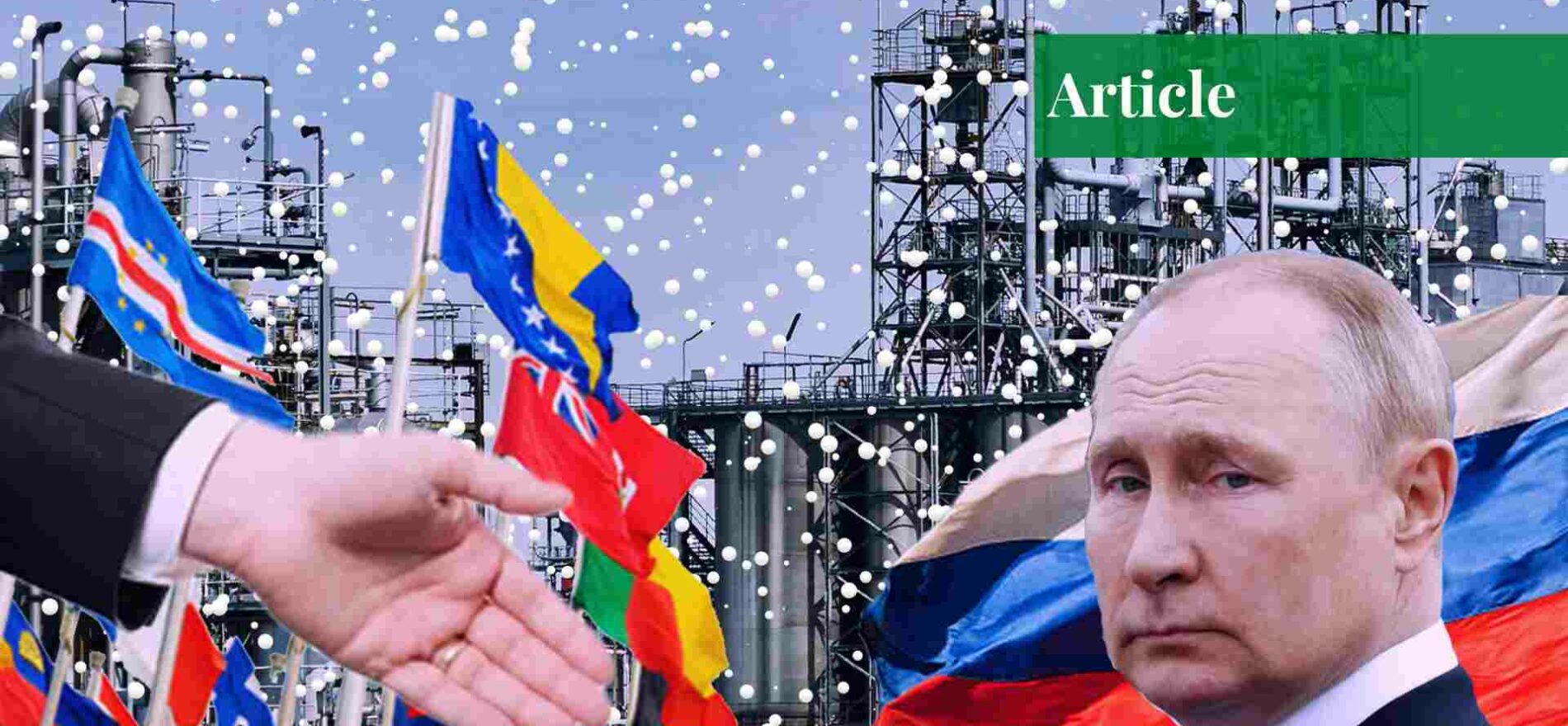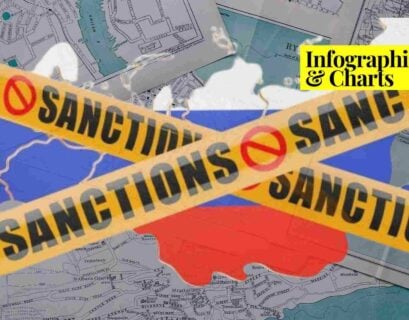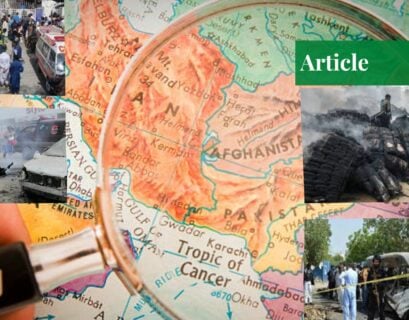Maryam Ibrahim has recently graduated from Lahore College for Women University with a bachelor's in international relations. Her sphere of interest includes the digitalization of international relations, specifically digital diplomacy.
A Fundamental Resource
A United States court, in the year 1907, stated that “oil is wild and will run away if it finds an opening.” Such a fundamental yet potent characteristic of oil explains why, if forced to exit the market via one door, Russian oil would find a way to reenter through another—either in its raw form or in a refined good.
In international relations, oil is a crucial resource and is essential for a number of reasons. It serves both military and commercial purposes and has been an essential component of contemporary economic growth and combat. Another explanation is that oil is distributed unevenly around the world. While most nations only have modest oil reserves, others have access to massive petroleum reserves.
These oil-scarce countries make an effort to get access to oil through commerce, diplomacy, and even violent conquest. Oil’s superior portability in comparison to other hydrocarbon resources is another factor.
Energy Crisis & the Russia-Ukraine War
For many of the oil-rich nations, the year 2020 was already off to a terrible start. However, soon after the Russian-Ukrainian crisis in 2022, an energy cold war began. It has somehow become a full-fledged energy crisis. There have been several types of energy battles throughout history, some of which saw oil prices soaring and others that saw them fall or even collapse.
The first such conflict, for instance, occurred in 1973 after the Yom Kippur War, when Arab nations led by Saudi Arabia, embargoed oil prices. Similarly, the West, led by the US, has sanctioned Russia’s oil imports in the ongoing energy crisis.
Estimating how many barrels would be lost in the world’s oil markets if the Russian supply was reduced as a result of embargoes or sanctions requires a lot of guessing. Russia’s oil exports have not yet been significantly affected by the conflict in Ukraine and the international sanctions. With oil prices at record highs, Russia increased its oil exports in April and May compared to the previous two months.
Russian oil production has been “limitedly impacted” by Western sanctions, but there are still plenty of customers, and the prices are high enough to keep government income strong and its coffers stocked. Russia, which is trying to find customers for its export of energy, finds the Asia market to be helpful in dealing with this issue.
The Energy Cold War
Urals crude, the main oil blend exported by Russia, currently costs 30% less than the international benchmark of Brent crude. All of the oil that was originally intended for the European market will now be sent to Asia. Several categories may be used to segment the Asian market. The nations in category A buy oil from Russia at a reduced price. The nations that band together to oppose the non-OPEC producer make up category B. The final group of nations comprises those that lie midway between categories A and B.
Category A
Asian countries like China and India continue to give money to Moscow and purchase inexpensive Russian oil while facing harsh criticism and resistance from the US, the EU, and other Western friends. As a result of the sanctions put in place due to the Ukraine war, the West has ceased importing energy, initiating the energy crisis.
India, a nation of around 1.4 billion oil consumers, utilized roughly 60 million barrels of Russian oil in 2022 because of its industry’s dependence on imported oil. According to a Kpler study, it only used 12 million barrels overall in 2021. However, in April and May alone, India imported 6 million barrels. An umbilical link has been established between the Indian energy industries and public sector enterprises as a result of the investments they made in each other’s oil sectors.

Since 85% of India’s energy needs are imported, the rising oil prices constitute a significant blow to the country’s economy. The Indian economy was impacted by the rise in crude oil prices, which also raised concerns about inflation, the state’s budget, and international commerce. In spite of criticism from the West, India is continuing with its commitment to buy Russian oil.
Six boats carrying the Russian oil known as ESPO were on their way to refineries in the South Asian nation in August, according to traders and shipbrokers. The amount represents around one-fifth of monthly shipments and is the highest amount of cargo India has bought since the stream was started. China, on the other hand, has been Russia’s largest crude oil market since 2016.
In an effort to at least theoretically free up supplies from other nations and increase the availability of refined fuels, China is setting the basis for taking an ever-increasing percentage of Russian crude oil at severe discounts. In response to Western sanctions on Moscow, Beijing increased its discounted imports of Russian oil.
In May, it increased to a record level of 8.42 million metric tonnes or 55% more than the 2021 imports. Russia is now China’s top oil supplier, surpassing Saudi Arabia as a result of the increase in imports. In a stark rebuke to the US-led West, China plans to purchase more energy from Russia.
Category B
Russian crude oil cargoes may find their way to the Asian market in the form of India and China however other Asian crude oil importers are committed to ending their trade with this non-OPEC producer. This regional coalition against Russian oil is led by South Korea, Thailand, and Japan. Russian crude imports by South Korea have decreased. As many businesses want to avoid trade, logistical, legal, and financial complexities that may harm their reputations, it is on pace to gradually phase out the imports of Russian crude imports.
As the fourth-largest crude importer in the world, South Korea is expected to choose competitive US crude and buy at least five to six VLCCs (Very Large Crude Carriers) of light-sweet US oil each month. South Korean refiners are conscientiously seeking to increase their term crude supply intake from big Middle Eastern sources to encourage maximum run rates. Since fewer than 4% of South Korea’s imports of refinery feedstock are light and medium sweet, reducing the supply of Russian crude would not have a significant impact on the country’s economy or refining sector.
According to remarks made by Japan and Thailand, substantial discounts on Russia’s Urals, ESPO, and Sokol are not worth accepting for refiners eager to preserve positive company reputations and those prepared to stand in unison against any acts of violence. Russian oil purchases from Japanese refiners have essentially stopped. Though the shortage of oil faced by Russia is being fulfilled by third parties like UAE, and the Middle East.
Category C
Despite worries about upsetting the West, Bangladesh is considering a proposal to import inexpensive Russian fuel as the South Asian country looks to protect its shrinking foreign exchange reserves and support its fragile economy. When it comes to purchasing oil, Dhaka has long-term agreements with nations in West Asia, but as oil trades at about $100 per barrel and unhappiness among Bangladeshi residents soars, Bangladesh is looking at proposals from Russia.
However, the Bangladeshi administration is concerned about how the West could view any potential agreement. Even if Moscow and Dhaka agree on an agreement, there are still a number of obstacles for the Bangladeshi government to overcome. Since major shipping firms no longer service Russian ports, shipping oil is a difficulty as well.
Asian nations including Myanmar, which is next door to Bangladesh, have purchased Russian oil. To settle shipping-related concerns, Bangladesh may likely contact Myanmar. Given the good ties between Moscow and Delhi, it may potentially consult India. Other nations and companies, including Indonesia’s Pertamina, are currently researching the dangers of buying Russian crude oil at a discount.
If you want to submit your articles/research papers/book reviews, please check the Submissions page.
The views and opinions expressed in this article/paper are the author’s own and do not necessarily reflect the editorial position of Paradigm Shift.


















